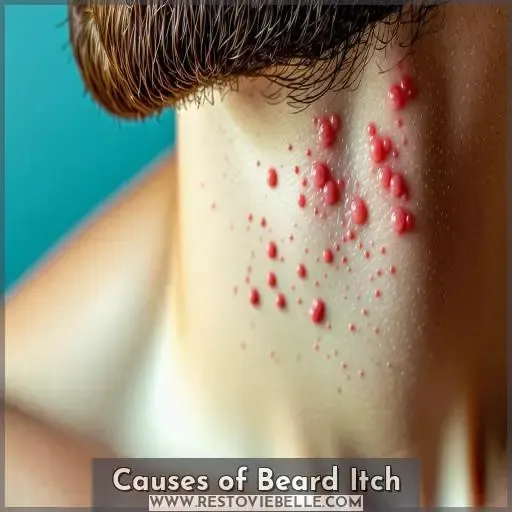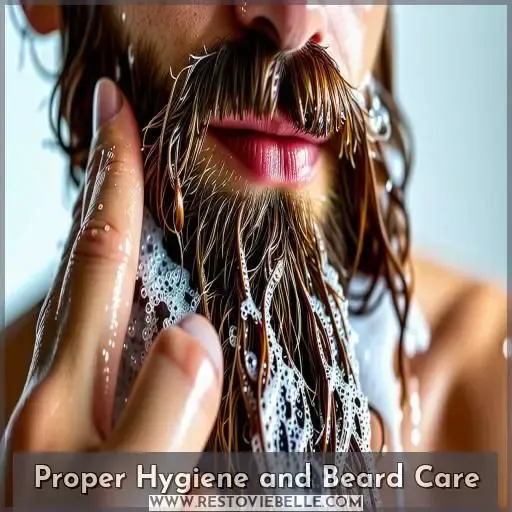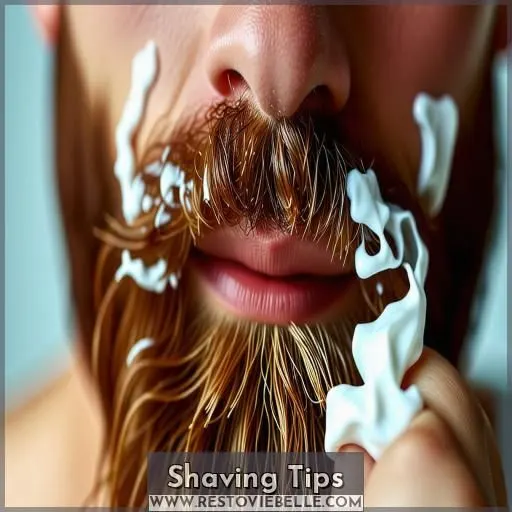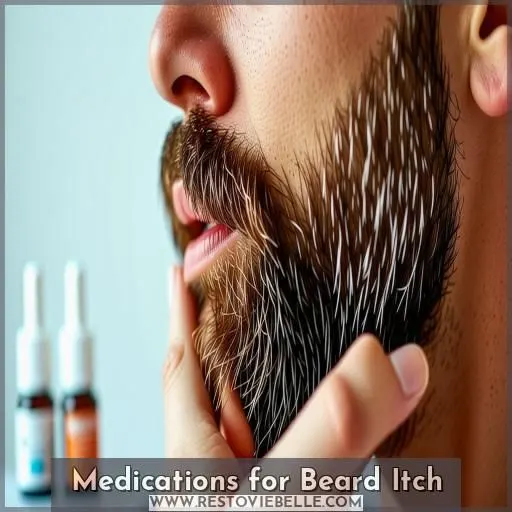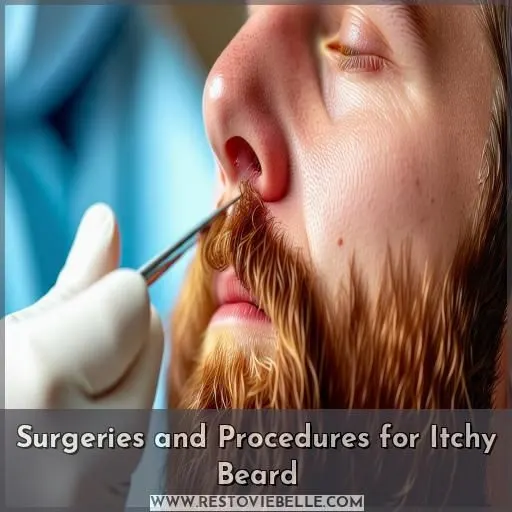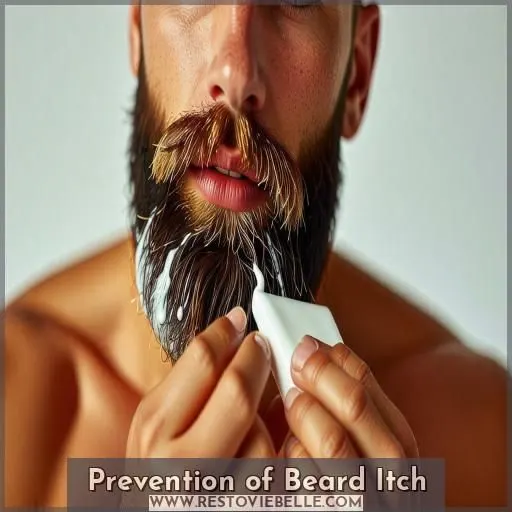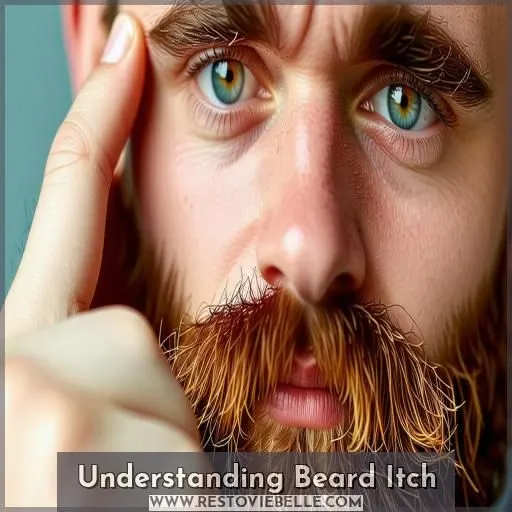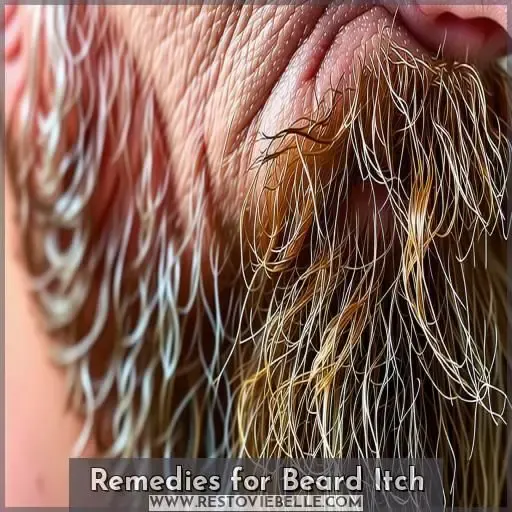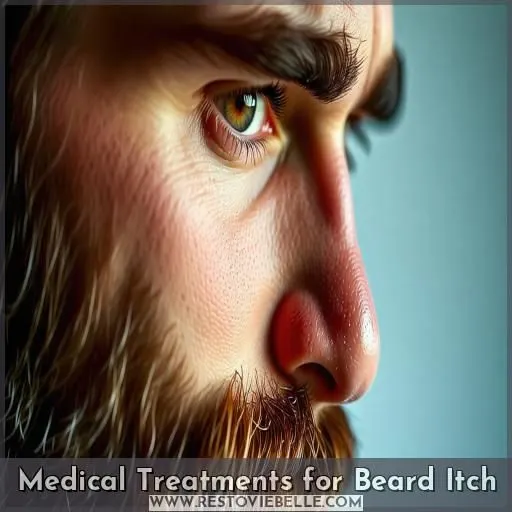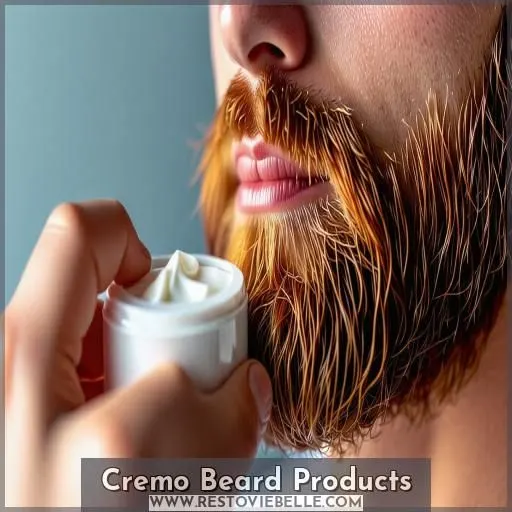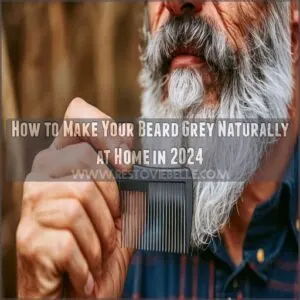This site is supported by our readers. We may earn a commission, at no cost to you, if you purchase through links.
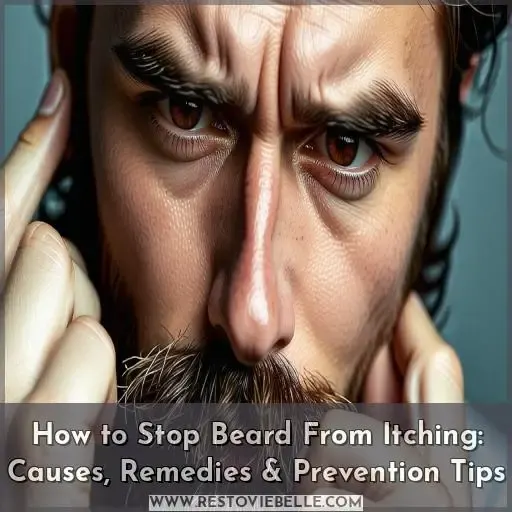 You can stop beard from itching by addressing the root causes through proper grooming.
You can stop beard from itching by addressing the root causes through proper grooming.
Wash your beard daily with a gentle cleanser to remove dirt and oils that clog pores.
Exfoliate regularly with a boar bristle brush to remove dead skin cells and prevent ingrown hairs.
Moisturize with a nourishing beard balm to lock in hydration and soothe irritation.
Trim your beard to keep it tidy and prevent split ends from scratching your skin.
If itchiness persists, consider medicated treatments like anti-fungal creams or corticosteroids.
But mastering a consistent beard care routine is key to stopping that maddening itch for good – and we’ll explore more proven tips ahead.
Table Of Contents
- Key Takeaways
- How to Stop Beard From Itching?
- Causes of Beard Itch
- Proper Hygiene and Beard Care
- Shaving Tips
- Medications for Beard Itch
- Surgeries and Procedures for Itchy Beard
- Prevention of Beard Itch
- Understanding Beard Itch
- Remedies for Beard Itch
- Medical Treatments for Beard Itch
- Cremo Beard Products
- Frequently Asked Questions (FAQs)
- How do I make my beard stop itching?
- How to make a beard less scratchy?
- Should beard oil itch?
- How to heal a beard burn?
- How can beard exfoliation help with itchiness?
- What are the benefits of using beard oils?
- What is the importance of proper beard drying?
- How does Cremo Medicated Beard Cream treat itchiness?
- What makes Cremo Beard Products unique for beard care?
- Conclusion
Key Takeaways
- Proper grooming through daily washing with a gentle cleanser, regular exfoliation, and moisturizing with a nourishing beard balm is key to preventing irritation and itchiness
- Causes of beard itch include dry skin, ingrown hairs, and folliculitis, which can be addressed through improved hygiene and beard care
- Medications like antifungal creams, corticosteroids, and medicated beard creams can help treat severe cases of beard itch
- Maintaining a consistent beard care routine focused on cleansing, conditioning, and moisturizing is essential for preventing and stopping beard itch
How to Stop Beard From Itching?
To alleviate beard itching, maintain adequate hygiene and beard care, and contemplate medical interventions if necessary. Prevention and comprehension of the causes are also paramount for effective itch relief. (Source)
Causes of Beard Itch
The causes of beard itch include dry skin, ingrown hairs, and folliculitis. Dry skin can lead to itchiness, while ingrown hairs and folliculitis can irritate the skin, causing itching .
Causes of Beard Itch
Beard itch stems from coarse hair, dry skin, ingrown hairs, and poor hygiene. Proper grooming and moisturizing can soothe irritation and prevent skin inflammation during beard growth .
Discussion Points
When exploring causes of beard itch, considerations like Seborrheic dermatitis, Pseudofolliculitis barbae, Tinea barbae, and the efficacy of laser hair removal or photodynamic therapy merit attention.
Dry Skin Causes Itchiness
Dry skin, also called xerosis, can make your beard itch. Use a beard moisturizer or oil to hydrate skin and prevent beard dandruff, flakes, and dermatitis .
Ingrown Hairs Irritate Skin
Ingrown hairs irritate skin, causing inflammation. Improve shaving technique, maintain beard health, and treat ingrown hairs promptly to prevent skin irritation and discomfort .
Folliculitis Leads to Itching
Folliculitis, caused by bacterial or fungal infections, leads to beard itching and inflammation. Treat with ointments or creams. Maintain good hygiene to prevent beard problems like fungus, eczema, itching, and dandruff.
Proper Hygiene and Beard Care
Now that you understand what’s causing that maddening itch, it’s time to take action and get your beard care routine in order.
Start by washing your beard daily with a gentle beard wash to remove dirt, oil, and dead skin cells that can lead to irritation.
Follow up with a nourishing beard conditioner to keep your facial hair soft and manageable.
Invest in a high-quality boar bristle beard brush to gently exfoliate and distribute your skin’s natural oils evenly throughout your beard.
Finish with a dab of beard balm to lock in moisture and tame flyaways.
With a little TLC, you’ll be rocking an itch-free, healthy beard in no time!
Shaving Tips
To achieve a comfortable shave and prevent beard itch, start by wetting the skin and hair before shaving to soften the hair and reduce irritation . Then, apply a high-quality shaving cream or gel to create a protective barrier between the razor and the skin, enhancing the glide of the blade . Shave in the direction of hair growth to minimize the risk of ingrown hairs and irritation . Remember to rinse after each razor swipe to clear away the cut hair and shaving cream, preventing clogged pores and potential skin issues. Finally, changing razor blades after 5-7 shaves makes sure a sharp blade for smoother, more comfortable shaves .
- Wet skin before shaving
- Apply shaving cream or gel
- Shave in the direction of hair growth
- Rinse after each razor swipe
- Change blades every 5-7 shaves
Medications for Beard Itch
If your beard is itchy due to dry skin, try using a facial moisturizer containing lactic acid or urea to hydrate and exfoliate.
For bacterial infections like folliculitis, your doctor may prescribe mupirocin (Bactroban) ointment.
Antifungal creams can treat fungal infections, while corticosteroid creams can reduce inflammation from noninfectious causes.
For seborrheic eczema, look for products with antifungal ingredients or low-dose topical steroids like hydrocortisone, clobetasol (Cormax), or desonide (Desonate).
Glycolic acid (NeoStrata) may help with pseudofolliculitis barbae.
Oral antifungal therapy may be needed for severe cases of tinea barbae.
Always consult your dermatologist for proper diagnosis and treatment of persistent beard itch or flakes.
Surgeries and Procedures for Itchy Beard
If your itchy beard persists despite proper hygiene and medication, your doctor may recommend surgical procedures.
Laser hair removal can permanently reduce facial hair growth, providing long-term relief for chronic itchiness.
For severe cases like boils or carbuncles, your doctor may need to make small incisions to drain the infected area.
Photodynamic therapy, a treatment that uses light-activated medication, can also help reduce inflammation and infection in the beard area.
While these procedures are more invasive, they can be effective for stubborn cases of beard itch that don’t respond to other treatments.
Consult with your dermatologist to determine if surgery is the right option for you.
Prevention of Beard Itch
To prevent beard itch, incorporate these techniques into your beard maintenance routine:
- Exfoliation: Regular exfoliation with a suitable product helps remove dead skin cells, preventing them from clogging hair follicles and causing itching.
- Moisturizer Selection: Opt for a moisturizer that’s non-comedogenic and contains anti-inflammatory ingredients like lactic acid and urea to keep the skin hydrated and prevent irritation.
- Beard Maintenance Routine: Implement a consistent beard care regimen, including washing, conditioning, and applying beard oils or balms to nourish and moisturize the hair and skin.
- Anti-inflammatory Treatments: Consider incorporating dietary supplements containing anti-inflammatory properties, such as omega-3 fatty acids, to help reduce inflammation and promote overall skin health. By focusing on exfoliation, appropriate moisturizer selection, a well-rounded beard maintenance routine, and anti-inflammatory treatments, you can effectively prevent beard itch and maintain a healthy, comfortable beard.
Understanding Beard Itch
You’ll likely experience itchiness as your beard initially grows out, especially if it’s your first time growing facial hair – this is caused by coarse hair shafts emerging from follicles and irritating the skin. Once your beard is fully grown, itchiness can still occur if you neglect proper hygiene and moisturizing routines, leading to dryness, dandruff buildup, or ingrown hairs.
Itchiness in New Beards
When you first start growing a beard, your face hasn’t been shaved for a couple of weeks.
Shaving acts as an exfoliant, so without it, dry skin builds up around your bearded region.
This irritation and itchiness is common in new beards.
Regularly washing your face with a gentle cleanser, combing to remove impurities, and moisturizing the skin can help soothe the itch as your beard grows in.
Be patient – the itchiness will subside as your beard matures.
Itchiness & Fully-grown Beards
Fully grown beards require diligent maintenance to prevent itchiness.
Neglecting exfoliation leads to dry, flaky skin trapping impurities.
Washing with a gentle beard wash and moisturizing with oil or balm is essential.
Combing or brushing stimulates follicles and removes buildup.
Failing to properly dry the beard after washing leaves water that dries out hair.
Protect your beard from pollutants with oil or balm to avoid irritation.
Severe cases may need medicated cream to reduce swelling, itch, and redness.
Remedies for Beard Itch
To alleviate beard itch, it’s essential to focus on remedies that directly address the underlying causes. For dry skin, the use of facial moisturizers, ointments, or creams containing lactic acid and urea can help restore moisture and alleviate itchiness (Source). The prevention of ingrown hairs can be achieved through proper shaving techniques, such as wetting the skin and hair before shaving, using shaving cream or gel, and shaving in the direction of hair growth to reduce irritation . Additionally, maintaining proper beard care, including daily washing with warm water and a suitable cleanser, and conditioning the beard with natural oils like jojoba or argan oil, can help prevent folliculitis and dry, flaky beards (Source).
Maintaining healthy beard hygiene is vital, as it can prevent several of the common causes of beard itch, including dry skin, ingrown hairs, and folliculitis. Using proper shaving techniques and selecting suitable beard care products can help alleviate and prevent beard itch .
Medical Treatments for Beard Itch
To address Beard Itch medically, different treatments target various underlying causes.
For bacterial infections, Mupirocin (Bactroban) can be effective.
While antifungal creams are suitable for fungal infections.
Noninfectious causes, including conditions like seborrheic eczema, may benefit from corticosteroid creams.
Hydrocortisone, clobetasol (Cormax), or desonide (Desonate) are options for treating seborrheic eczema specifically.
These medications aim to alleviate symptoms and improve the overall condition of the beard area.
In cases where medical treatments are not sufficient, surgical procedures such as laser hair removal can be considered to address chronic conditions contributing to beard itchiness.
Seeking medical advice for proper diagnosis and treatment guidance is essential to effectively manage different causes of beard itch.
Cremo Beard Products
Cremo offers a range of superior beard health products designed to address specific beard needs.
The Beard & Face Wash provides effective cleansing and moisturizing. The Beard Oil and Balm offer hydration and protection.
These products contain unique ingredients designed to promote beard health. Incorporating Cremo’s Medicated Beard Cream into your beard care routine can help alleviate swelling, itchiness, and redness, ensuring healthy beard growth.
With the benefits of jojoba and argan oil, Cremo products provide essential nourishment for your beard, effectively addressing dryness and maintaining overall beard health.
Frequently Asked Questions (FAQs)
How do I make my beard stop itching?
Wash your beard daily with a gentle cleanser, exfoliate regularly, and moisturize with a beard oil or balm. Avoid irritants, and for severe itching, use a medicated beard cream containing hydrocortisone or antifungal ingredients.
How to make a beard less scratchy?
Exfoliate regularly and moisturize your beard with beard oils or balms containing natural ingredients like argan, jojoba, or grapeseed oil. This will soften the coarse hair and prevent itchiness.
Should beard oil itch?
No way, José! A good beard oil should feel gloriously nourishing, like a soothing hydration oasis for your rugged mane. If it itches, something’s amiss – ditch it for a quality blend ASAP.
How to heal a beard burn?
To heal a beard burn, avoid shaving until it subsides. Apply a cold compress, take OTC anti-inflammatories, and use a gentle, fragrance-free moisturizer. For severe cases, see a dermatologist for prescribed treatments.
How can beard exfoliation help with itchiness?
Exfoliating your beard removes dead skin cells, dirt, and oils. It prevents ingrown hairs that cause irritation. Use a gentle scrub, brush, or comb to help lift away buildup.
What are the benefits of using beard oils?
Ever wonder how beard oils keep your facial mane smooth and itch-free? These nourishing blends replenish your skin’s natural oils, preventing dryness – the root of irritation. By locking in moisture, beard oils cultivate a soft, comfortable beard you’ll love sporting.
What is the importance of proper beard drying?
Proper beard drying prevents moisture build-up, reducing bacterial growth and unpleasant odors. Thoroughly towel-drying or using a hair dryer guarantees your beard stays clean, fresh, and comfortable.
How does Cremo Medicated Beard Cream treat itchiness?
Tired of the constant itch? Cremo’s Medicated Beard Cream reduces swelling, redness, and in-grown hairs – a triple threat against that dreaded beard itch. With ingredients designed to soothe inflamed skin, you’ll finally experience itch-free bliss.
What makes Cremo Beard Products unique for beard care?
Cremo’s Beard Products are unique because they address specific beard needs with carefully selected ingredients, like the Medicated Cream that soothes redness and swelling.
Conclusion
Mastering diligent maintenance alleviates infuriating beard itchiness. Regularly cleansing, exfoliating, moisturizing, and trimming your facial hair stops irritation. If discomfort continues, proven remedies like medicated creams combat causes like dryness or folliculitis. Adhering diligently to this customized regimen guarantees you end beard itching, promoting supreme comfort and grooming satisfaction.

